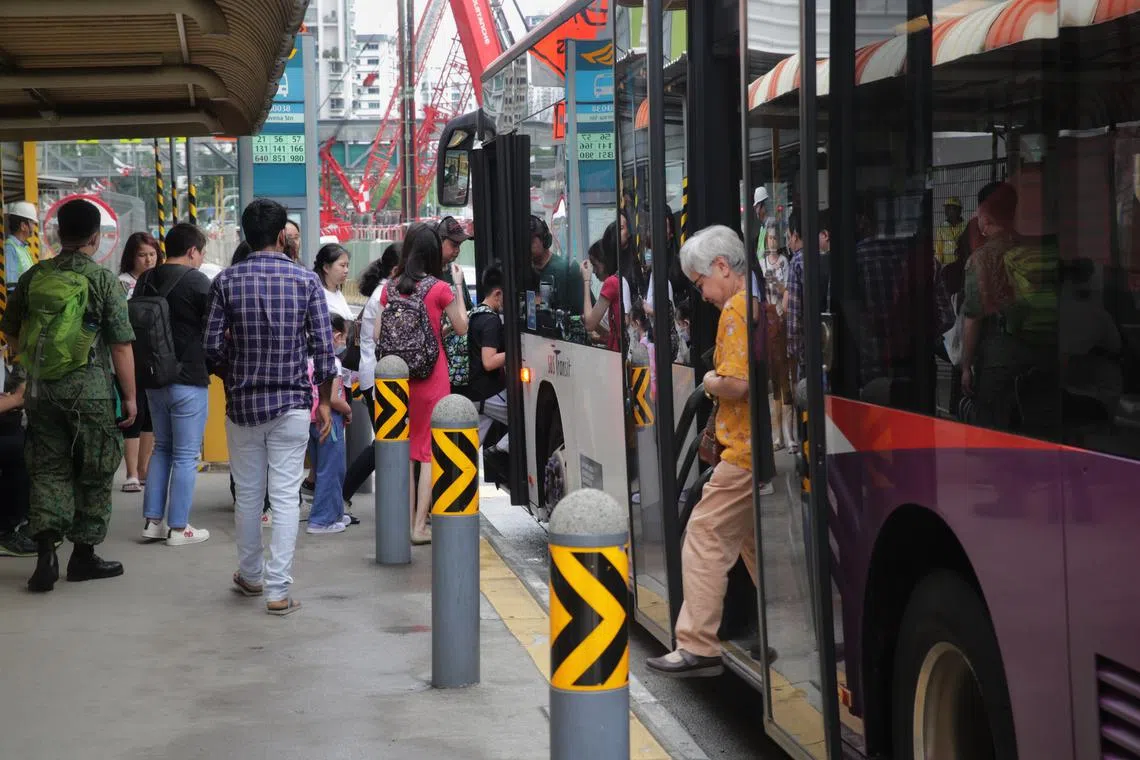Scheme to encourage NEL commuters to switch to buses during morning peak resumes after review
Sign up now: Get ST's newsletters delivered to your inbox

Transport Minister S. Iswaran also noted that the recovery in bus and MRT ridership has been uneven.
ST PHOTO: GIN TAY
SINGAPORE – An incentive scheme that offers cash rewards to commuters who switch from the North East Line (NEL) to express bus services during the morning peak hours will resume on Monday after an eight-month hiatus.
The Travel Smart Journeys scheme will also be expanded to include five City Direct bus services that serve the north-eastern region of Singapore – 654, 660, 666, 671 and 672.
This is on top of bus service 43e, which connects commuters living in Punggol, Sengkang and Buangkok directly to major employment centres in MacPherson, Paya Lebar and Marine Parade via the Kallang-Paya Lebar Expressway.
The expanded scheme will benefit residents in Punggol, Sengkang, Buangkok and Hougang who commute to workplaces in eastern and central parts of Singapore, the Land Transport Authority (LTA) said in a statement on Friday.
Points earned through the Travel Smart Journeys scheme can potentially offset more than half of the bus fares paid by those who use the six select express bus services regularly, LTA added.
Express bus services cost 60 cents more than regular bus and MRT rides for adults. The fares are charged by distance and range from $1.59 to $2.86 if paid for using a travel card.
LTA said commuters must register using the TransitLink SimplyGo Web portal or the TL SimplyGo application to be eligible for the Travel Smart Journeys scheme.
Within the last 30 calendar days before the day of registration, they must also have tapped in at Punggol, Sengkang, Buangkok or Hougang MRT stations, or any station along the Punggol and Sengkang LRT lines, between 7am and 9am on at least four weekdays, excluding public holidays.
After registering, these eligible commuters will receive 150 points per bus ride if they switch to bus services 43e, 654, 660, 666, 671 or 672 between 7am and 9am on weekdays, and alight at destinations in Tai Seng, MacPherson, Paya Lebar, Parkway Parade, Shenton Way or Marina Boulevard.
The points can then be redeemed in 500-point blocks, with each block equivalent to $5.
Launched in February 2020, Travel Smart Journeys aimed to redistribute peak-hour public transport demand by encouraging commuters to adopt alternative modes of travel. It started as a trial with bus service 43e, but the Covid-19 pandemic struck soon after.
LTA later suspended the initiative in July 2022 to review it, citing shifting travel patterns due to hybrid work arrangements.
In response to queries, LTA said about 53,500 commuters had signed up for the scheme before its suspension. “As travel patterns were changing quickly in 2022 due to several factors, including the resumption of economic activity and changes in hybrid work arrangements, LTA decided to use the opportunity to pause and review the programme to better cater to the current needs of commuters,” it added.
In this time, LTA said public transport ridership during the morning peak hours had recovered to close to 90 per cent of pre-Covid-19 levels, especially for trips to the central and eastern regions of Singapore.
Hence, the authority said it was timely to resume the scheme and expand it.
“With more resuming their commutes, we anticipate an increase in travel demand for the NEL,” LTA added. “We will study the effectiveness of Travel Smart Journeys before extending the scheme to other rail lines.”
In the second half of 2022, the average daily ridership for NEL stood at 527,000 trips – a 47 per cent increase from the year before but short of the average daily ridership of 600,000 trips before the pandemic struck.
Punggol resident Jael Lai, 31, said the crowds have returned to the NEL during the morning rush hour.
“It’s so crowded that even though Punggol is the first stop, not only is it hard to get a seat, but there are also people who would avoid the train that is arriving and wait for the subsequent one,” said the programme manager in the community care sector, who takes the MRT to Chinatown to get to work.
While Ms Lai said she would be willing to take an express bus as it allows for a more comfortable and hopefully shorter commute, there are no express services which run between her home and workplace.
The Travel Smart Journeys initiative had replaced an earlier, broader Travel Smart Rewards programme that was introduced in 2014 to reward commuters for travelling during off-peak hours on weekday mornings.
That programme ended in 2019, with the LTA citing the enhancements made to the rail network, such as the addition of the Downtown Line and Tuas West Extension, that helped to improve peak hour loads.
Lower fares for morning pre-peak hours were also established across the MRT network, hence the authority said then that the focus would be shifted to more localised initiatives to better distribute the peak hour travel load.
Since December 2017, fares for MRT and LRT rides are 50 cents cheaper for commuters who tap in before 7.45am on weekdays.



